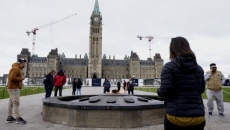Central banks have been trying their best to convince the public that their interest rate hikes are ultimately for the greater good.
But not everyone is buying it.
An informal coalition of labour groups, political leaders and economists has formed over the last year and a half to challenge the very economic concepts behind monetary policy.
In particular, these voices have objected to central banks' focus on cooling the labour market, something that would ultimately mean a higher unemployment rate and lower wage growth.
Economists traditionally view a hot labour market as a sign of an overheated economy and is one of the indicators central banks monitor for inflation.
In the U.K., economist Ann Pettifor has argued central banks have been obsessed with crushing demand and "disciplining" workers. Meanwhile, Wharton School emeritus professor of finance, Jeremy Siegel has called the U.S. Federal Reserve's focus on the labour market "misguided."
The pushback comes at a time when workers are already feeling squeezed by affordability issues and politicians are increasingly choosing to weigh in on rate decisions.
Here in Canada, economist Jim Stanford has been a notable voice speaking out against the Bank of Canada's hefty interest rate increases. In numerous newspaper columns and media interviews, Stanford has argued the Bank of Canada is scapegoating workers for high inflation.
"The inflation that we experienced, beginning in 2021, had nothing to do with the labour market. But the Bank of Canada from the get-go, has been blaming an overheated economy and unemployment that's too low," Stanford said in an interview.
Stanford, who is the director of the Centre for Future Work, pointed to a speech Bank of Canada governor Tiff Macklem gave in November 2022 on the relationship between employment and inflation.
Speaking at Toronto Metropolitan University, Macklem explained why a low unemployment rate was concerning to the central bank.
"The unemployment rate in June hit a record low — and while that seems like a good thing, it is not sustainable," Macklem said. "The tightness in the labour market is a symptom of the general imbalance between demand and supply that is fuelling inflation and hurting all Canadians."
From Stanford's perspective, Macklem's argument is both morally and economically wrong.
"Imagine if Tiff Macklem went to the parking lot outside Loblaws and told people who just paid $200 for their cart of groceries, 'you know why you paid so much for your food? It's because the unemployment rate is too low, and wages are growing too quick,'" Stanford said.
"He would have been chased out of the parking lot. Because average people understand they are not the source of this problem."
Western University economics professor Stephen Williamson says the criticisms central banks are facing today are not new.
"You would have seen that way back in other inflationary episodes, this kind of idea of, 'you're bringing inflation down, but you're making people suffer,'" he said.
Although Williamson doesn't fit in either camp of this debate over interest rate hikes, the academic has some doubts about the conventional wisdom behind monetary policy. In particular, he's skeptical about the supposed relationship between employment and inflation.
"We've had inflation come down in the U.S. with virtually no change in unemployment. Here, we've had a little bit of an upturn in the unemployment rate, but not so much," Williamson said.
"So if anybody is trying to say now, that, 'Oh, we need, we really need to introduce some slack in the labour market, we need to have more unemployed people to bring inflation down, you just have to point to the experience so far with bringing (inflation) down."
Since March 2022, the Bank of Canada has raised its key interest rate from near-zero to five per cent — the highest it's been since 2001.
While inflation has not yet come back to target, it has fallen from a high of 8.1 per cent to four per cent in August.
To the surprise of many, the labour market remained relatively resilient even as interest rates climbed.
More recently, however, Canada's unemployment rate has started to tick up to 5.5 per cent, and forecasters expect it to continue rising.
Higher interest rates are starting to slow the economy, something the central bank says is necessary to restore balance between demand and supply.
A slowdown, however, would come with consequences.
"Slower economic growth will likely lead to higher unemployment," Macklem conceded last November during his speech.
Meanwhile, Stanford argues that the cause of high inflation is not that people are spending too much or workers are making more money. Instead, he largely attributes the rise in inflation to the global circumstances post-pandemic, as well as high profits.
The Bank of Canada has mostly considered high profits to be a symptom of excess demand in the economy. But a recent speech by deputy governor Nicolas Vincent suggests the central bank is paying closer attention to how corporate pricing has changed since the pandemic, and whether larger and more frequent price increases may become "self-perpetuating."
Speaking to business leaders at the Chamber of Commerce for Metropolitan Montreal, Vincent said the central bank believes larger and more frequent price increases from businesses is contributing to sticky inflation.
"We believe that this behaviour by firms – both here and abroad – is intimately linked to the stronger-than-expected inflation we’ve seen," Vincent said.
While Vincent's comments were new for the Bank of Canada, it's not clear how they may influence rate decisions in the future.
The fact that unemployment is likely to rise is an uncomfortable truth for central banks dealing with backlash over rising interest rates.
But former Bank of Canada governor David Dodge said raising the unemployment rate when inflation is high is exactly what central banks should do. He also rejected the idea that higher interest rates ultimately hurt workers.
"That's absolutely wrong. What really hurts workers is inflation. We've got, we've got a century of history on that," Dodge said.
The former governor and long-time federal public servant conceded higher interest rates will affect people differently. But he said it’s up to governments to address those uneven effects.
"The distributional effect is in the hands of government. It's not in the hands of the central bank," Dodge said.
While Stanford's take on monetary policy is still the outlier, the debate over rising interest rates has filtered through to the political realm. Last month, multiple premiers called on the Bank of Canada to stop raising rates, while the NDP suggested the federal government should ask the central bank the same thing.
Even Finance Minister Chrystia Freeland found herself facing criticism for calling the Bank of Canada's decision to hold interest rates "welcome relief for Canadians."
After ten consecutive rate hikes, and with rate hikes not yet ruled out by the central bank, it's clear that the Bank of Canada has mostly ignored calls to stop raising rates.
The federal government has also left the inflation-fighting job to the Bank of Canada, ignoring calls to bring in widespread windfall taxes or impose price regulations, which are policies Stanford supports.
Still, Stanford is happy to see unconventional voices get a larger platform in the debate over monetary policy. That phenomenon reflects people's appetite for an economic system that works better for them, he said.
“Average people understand they are not the source of this problem. And in that regard, I think there'll be a very fertile popular environment in which to discuss alternatives to the status quo.”






